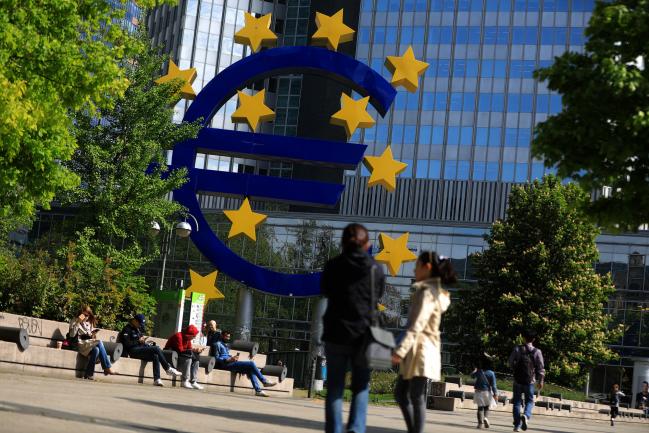 © Bloomberg. Visitors look at the euro sign sculpture as it stands near the former European Central Bank (ECB) headquarters in Frankfurt, Germany, on Wednesday, April 25, 2018. Photographer: Krisztian Bocsi/Bloomberg
© Bloomberg. Visitors look at the euro sign sculpture as it stands near the former European Central Bank (ECB) headquarters in Frankfurt, Germany, on Wednesday, April 25, 2018. Photographer: Krisztian Bocsi/Bloomberg(Bloomberg) — Central banks from Frankfurt to Ottawa appear to be taking a lower gear on the road away from easy monetary policy amid signs some key economies are slowing.
The avoided any discussion of its next steps toward ending bond buying and Sweden’s Riksbank pushed back a plan to raise for the first time in seven years. Just days earlier, the Bank of Canada governor said more work is needed to heal the scars of the crisis.
The left its monetary stimulus program unchanged on Friday, as expected, but removed previous wording on reaching its 2 percent inflation around fiscal 2019, underscoring just how much more time will be needed to reach its 2 percent target. Its overall inflation forecasts were largely unchanged.
While the U.S. Federal Reserve has set the example in moving on from a decade of rock-bottom interest rates and quantitative easing, the preference elsewhere to be unhurried has been strengthened by weakening global growth prospects and threats of protectionism. Central banks have fought hard to restore inflation since the financial crisis, but there’s little hard evidence as yet that the battle is won.
“The recent data create uncertainty and that, together with weak inflationary pressures, points to a very slow exit,” said Nick Kounis, an economist at ABN Amro Bank NV in Amsterdam. “For the ECB, which which was already having doubts even against the background of a strong economy, this is a reason to go slow.”
The strongest global expansion since 2011 is set to continue for another two years, but the International Monetary Fund has warned that risks are mounting. A potential protectionist spiral, unstable geopolitics and the impact of the U.S. fiscal stimulus will weigh on an upswing that may be running out of steam.
Following the lead of the Fed, most central banks in developed economies are seeking to rein in the stimulus they deployed to counter the global crisis. Yet for some, the slowdown may complicate a tightening process is still in its early stages.
“Tightening monetary conditions would be premature at this juncture, and would risk unnecessarily jeopardizing the positive economic momentum that has been established,” Swiss National Bank President Thomas Jordan said in Bern on Friday.
ECB President on Thursday said policy makers refrained from discussing the end of asset purchases or even the stronger euro as they focused on gauging the health of the region’s economy. Momentum has waned since the start of the year, and any pickup in underlying inflation appears to have stalled.
Don’t expect the ECB to announce any changes until at least June. Officials may even be ready to wait until July, according to people familiar with the matter.
“We didn’t discuss monetary policy per se,” Draghi said. “Incoming information since our meeting in early March points towards some moderation, while remaining consistent with a solid and broad-based expansion of the euro-area economy.”
Last week, Bank of Canada Governor said the job of escaping the financial crisis still isn’t done, and Bank of England Governor left a previously imminent open to doubt.
The Fed, which is expected to leave policy on hold at the next week, has led the way on policy tightening with six interest-rate increases since 2015. Still, officials appear willing to let the economy heat up to ensure that inflation becomes embedded.
“There is no reason not to give numbers a second look, even for those central banks whose economies is running hotter,” Kounis said. “If they turn out to be noise, they will reassess the situation.”
Source: Investing.com


























